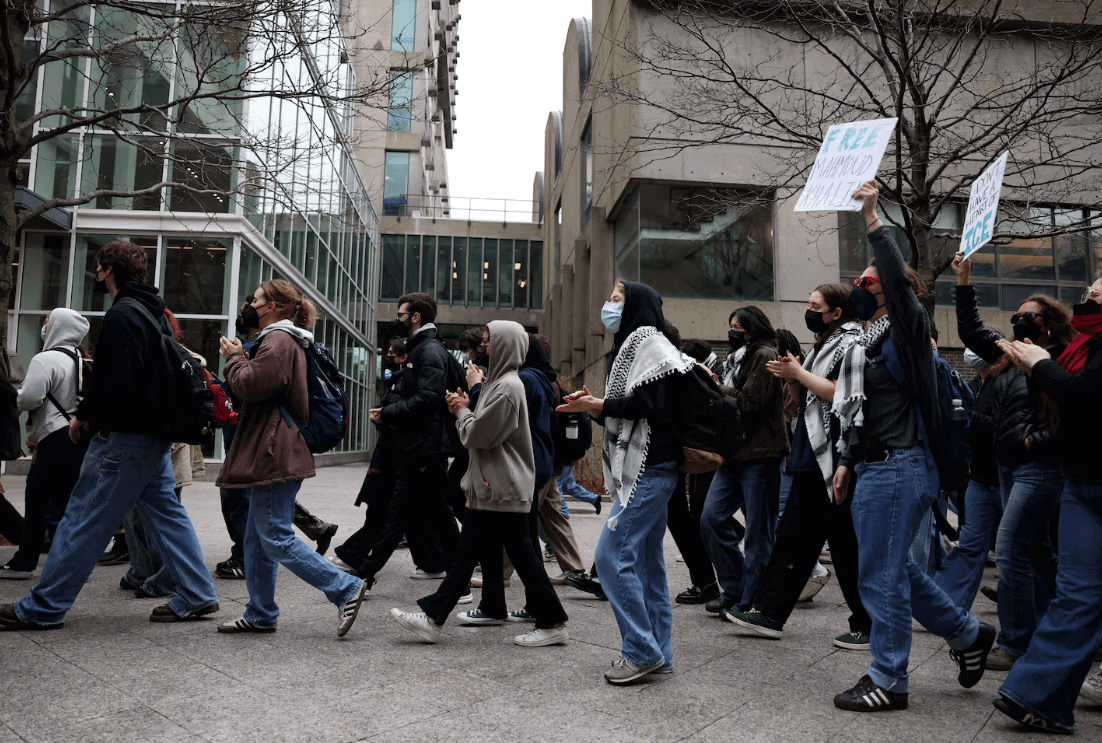为什么马萨诸塞州这么多学生失去签证?答案就藏在一个鲜为人知的数据库中

【中美创新时报2025 年 4 月 15 日编译讯】(记者温友平编译)据美国移民律师协会 (American Immigration Lawyers Association)称,特朗普政府突然终止了全美近5000名国际学生和学者的合法身份,在全美各地校园引发恐慌。《波士顿环球报》记者布鲁克·豪瑟和萨曼莎·J·格罗斯对此作了下述报道。
起初只有少数与亲巴勒斯坦活动有一定关联的学生,后来又增加了数十人,其中许多人与抗议运动毫无关联。如今,据美国移民律师协会 (American Immigration Lawyers Association)称,特朗普政府突然终止了全美近5000名国际学生和学者的合法身份,在全美各地校园引发恐慌。
很多学生来自中国、印度、韩国、沙特阿拉伯和尼日利亚,但也有一些来自埃及、墨西哥、土耳其和牙买加等国的学生。他们 学习的专业涵盖计算机科学、工程学、儿童和人类发展等各个领域。而现在,他们发现自己身处一个可怕的困境——未经联邦政府许可就留在美国,面临被逮捕、拘留和驱逐出境的风险。
许多学生不知道自己为何会被“终止学籍”——这是美国移民和海关执法局的官方说法。是抗议活动还是政治评论引起了警觉?是一张旧的超速罚单,还是被机器人截取的社交媒体帖子?
高等教育机构、律师和学生权益团体也 处于迷茫之中,忙于寻找如何维护学生正当程序权利的方法。
移民律师丹·伯杰 (Dan Berger) 在北安普敦的办公室表示:“这件事很不正常。”
过去,学生身份的变更通常由大学自行进行,通过一个鲜为人知的数据库“学生和交流访问者计划”(SEVIS)进行。
该数据库由国土安全部下属的移民与海关执法局 (ICE) 管理,但主要由国际学生顾问或其他指定的学校官员维护,他们负责根据联邦法规报告学生良好信誉的任何变化,例如可能影响其身份的逮捕。
但据各学院称,最近几周,ICE 未经咨询或通知院校,就擅自进入其数据库,终止了学生的学籍。学校获悉这些终止学籍信息的唯一途径是主动监控数据库,以了解学籍状态的变化。
“撤销就像公寓钥匙被没收了。终止就像驱逐,”一位SEVIS用户(一位高等教育经理)说道,他因担心联邦政府报复而不愿透露姓名。“前者意味着你不能进入。后者意味着你不能留下。”
国务院负责实际的签证旅行证件,通常会盖在护照上,用于签发入境许可。 但对于在SEVIS数据库中身份被终止的学生,之前的签证印章无法提供帮助。
从历史上看,遇到潜在身份问题的学生(例如无意中注册的课程量低于规定的全部课程量)可以咨询学校官员来解决这个问题。
伯杰说:“签证撤销的情况相对罕见”,大多数与刑事定罪有关。
特朗普政府任意 终止学生身份的做法,让学校根本没有机会帮助解决问题。马萨诸塞州法律改革研究所高级移民律师希瑟·扬茨表示,这“明显违反”了学生在第五修正案下享有的正当程序权利。
高等教育和移民总统联盟首席执行官米里亚姆·费尔德布鲁姆表示,她的非营利组织已经收到数百名校长、校监和大学管理人员的来信,他们表示,虽然他们通常会与政府合作,帮助学生要求更正或解释,但现在他们实际上被排除在这一程序之外。
特朗普总统的发言人和国土安全部均未回应置评请求。美国国务院在一封电子邮件中表示,其“正在审查签证签发后出现的信息,这些信息可能表明签证资格可能不合格……对公共安全构成威胁,或其他应予撤销的情况”,例如“逮捕、刑事定罪以及从事与签证类别不符的行为”。
由于这一过程是持续进行的,而且该部门“每天都会撤销签证”,因此这个数字是“动态的”。
大学领导敦促国际学生留意电子邮件中是否有撤销通知,而学校官员现在每天早上都会登录SEVIS系统,查看学生是否被开除。与此同时,高等教育领导人正在权衡在数十亿美元联邦资金可能面临风险的情况下发声的风险。
“这对学生和学校来说都是一个陷阱。如果学生不离开美国,放弃正当程序权利,他们可能会被移民和海关执法局(ICE)逮捕,并被遣送至路易斯安那州……或者面临被驱逐出境,”扬茨说道。然而,在美国境内挑战解雇 令“让学生感到恐惧和困难”。
但个别学生和学校联盟开始反击。新罕布什尔州美国公民自由联盟代表达特茅斯学院博士生刘晓天提起诉讼,SEVIS 正是该诉讼的核心。刘晓天的律师表示,联邦政府“出于未知且未指明的原因”终止了他的 SEVIS 身份,并请求法院颁发临时限制令。一位联邦法官上周同意批准这项短期救济。
同样在上周,高等教育与移民总统联盟(Presidents’ Alliance on Higher Education and Immigration)联合86所学院、大学和高等教育协会,就美国大学教授协会诉鲁比奥一案提交了一份法庭之友陈述,该案质疑特朗普政府的驱逐出境政策。包括阿默斯特学院、史密斯学院、曼荷莲学院和威廉姆斯学院在内的马萨诸塞州院校签署了支持该陈述的协议,该陈述认为,“通过终止学生的SEVIS记录,政府似乎正在为逮捕和驱逐他们铺平道路。”
周五,美国司法部长安德里亚·乔伊·坎贝尔(Andrea Joy Campbell)与19名总检察长共同向马萨诸塞州美国地方法院提交了另一份法庭之友陈述书。律师们写道:“当学生和教职员工担心因表达某些观点而被驱逐出境时,整个学术体验都会受到影响。”
伯杰和他的律师事务所Green and Spiegel已为100多名受影响的国际学生提供咨询服务。他将自己的工作描述为“分诊”——迅速将他们与其他律师联系起来。
扬茨几乎每天都能听到学生们自愿离开美国的消息,他们留下了研究成果和未完成的学位。她指出,特朗普政府给学生们带来了寒蝉效应,他们“转过身,回头看看,担心自己会不会是下一个”。
因为担心的是,终止身份的可能是任何人——出于任何原因。过去,学生可能因为未到校上课(“缺席”)或收到其他类型的文件(例如绿卡)(“身份变更”)而被终止。但现在,根据国际教育工作者协会 (NAFSA) 的说法,很多情况下,终止身份的原因都被列为“其他”,并“含糊地提及犯罪记录检查和/或签证撤销”。
“‘其他’是什么意思?”这位高等教育经理问道。“这对我们来说感觉很新。”
在当前的环境下,许多人觉得它带有惩罚性和威胁性,这让一些SEVIS系统的支持者想起了它的起源。该数据库于2003年部署,是9·11事件后《美国爱国者法案》的成果,当时其中一名劫机者被发现持学生签证滞留在美国。
在这种氛围下,学生们正在权衡是否值得继续留下来。移民律师、前签证官和外交官、签证咨询公司Argo Visa创始人克里斯·理查森(Chris Richardson)表示,许多人自愿离开,希望将来能重新申请签证。他与一些违规行为轻微的学生进行了交谈,这些学生已经返回祖国,希望保护自己的记录,并保留返回美国的能力。
留下来的人生活在深深的不确定性之中。这种做法“无疑会减少美国的国际学生入学人数,”费尔德布鲁姆说。“现在的做法是阻止、拒绝,明确地告诉他们,‘你们不受欢迎’。”
题图:波士顿大学学生游行穿过波士顿大学法学院,抗议要求波士顿大学宣布为“庇护校园”,保护学生免受联邦政府的侵害,无论其移民身份如何。Jessica Rinaldi/《波士顿环球报》员工
附原英文报道:
Why are so many students in Mass. losing their visas? The answer lies in a little-known database.
By Brooke Hauser and Samantha J. Gross Globe Staff,Updated April 15, 2025
Students at Boston University marched past the BU School of Law as they protested to demand that BU declare itself a “sanctuary campus” and protect students from the federal government regardless of their immigration status. Jessica Rinaldi/Globe Staff
At first it was just a handful of students with some connection to pro-Palestinian activity, then dozens more, many of whom had no link to the protest movement. Now the Trump administration has abruptly terminated the legal status of nearly 5,000 international students and scholars across the country, according to the American Immigration Lawyers Association, setting off waves of fear on campuses around the country.
A good number of students are from China, India, South Korea, Saudi Arabia, and Nigeria, though they also represent countries like Egypt, Mexico, Turkey, and Jamaica. They’re studying everything from computer science and engineering to child and human development. And they now find themselves in a terrifying limbo — in the United States without the permission of the federal government and at risk of arrest, detention, and deportation.
Many of the students have no idea why they’ve been targeted for “termination” — the official Immigration and Customs Enforcement designation. Was it a protest or political op-ed that sent up a red flag? An old speeding ticket or social media post picked up by a bot?
Higher education institutions, lawyers, and student advocacy groups are also in the dark, scrambling to figure out how to safeguard students’ due process rights.
“Nothing about this is normal,” immigration attorney Dan Berger said in his Northampton office.
In the past, changes to a student’s status were generally made by the colleges themselves, in a little-known database called the Student and Exchange Visitor Program, or SEVIS.
The database is run by ICE under the Department of Homeland Security but is largely maintained by international student advisers or other designated school officials, who are responsible for reporting any changes to a student’s good standing such as an arrest that might affect their status, in accordance with federal regulations.
But in recent weeks, ICE has gone into its own database to terminate student statuses without consulting or alerting the institutions, the colleges say. The only way schools have found out about the terminations is by actively monitoring the database for status changes.
“A revocation is like having the key to your apartment taken away. A termination is an eviction,” said one SEVIS user, a higher education manager, who asked not to be named for fear of retaliation by the federal government. “The first means you can’t enter. The second means you can’t stay.”
The State Department is in charge of the actual visa travel document, typically stamped into a passport, that allows entry into the country. But that preexisting visa stamp can’t help a student whose status is terminated in the SEVIS database.
Historically, students dealing with a potential status issue, like inadvertently enrolling below the required full course load, could consult with school officials to address it.
“Visa revocations were relatively rare,” Berger said, with most related to a criminal conviction.
The Trump administration’s arbitrary termination of a student’s status gives schools no chance to help fix the problem. It is, said Heather Yountz, a senior immigration attorney at the Massachusetts Law Reform Institute, “a clear violation” of the student’s due process rights under the Fifth Amendment.
Miriam Feldblum, chief executive of the Presidents’ Alliance on Higher Education and Immigration, said her nonprofit has heard from hundreds of presidents, chancellors, and university administrators who say that while they typically work with the government to help students request corrections or explanations, they are now effectively shut out of the process.
Neither a spokesperson for President Trump nor the Department of Homeland Security responded to requests for comment. In an email, the State Department said it “looks at information that arises after the visa was issued that may indicate a potential visa ineligibility . . . pose a threat to public safety, or other situations where revocation is warranted,” such as “arrests, criminal convictions, and engaging in conduct that is inconsistent with the visa classification.”
Because the process is ongoing, and the department “revokes visas every day,” the number is “dynamic.”
University leaders have urged international students to monitor their email for revocation notices, while school officials are now logging onto SEVIS each morning to see if their students have been terminated. Meanwhile, higher education leaders are weighing the risks of speaking out when billions of dollars in federal funding could be on the line.
“This is a trap for students and for schools. If students don’t leave the country and forgo their due-process rights, they could be arrested by ICE and sent to Louisiana . . . or face deportation,” Yountz said, and yet challenging a termination from within the United States “feels scary and difficult for students.”
But individual students and coalitions of schools are beginning to fight back. SEVIS is at the heart of a lawsuit filed on behalf of a Dartmouth College doctoral student, Xiaotian Liu, by the ACLU of New Hampshire. Liu’s lawyers say the federal government terminated his SEVIS status “for unknown and unspecified reasons” and asked the court for a temporary restraining order. A federal judge agreed last week to grant the short-term relief.
Also last week, the Presidents’ Alliance on Higher Education and Immigration, along with 86 colleges, universities, and higher ed associations, filed an amicus brief related to the American Association of University Professors v. Rubio lawsuit, which challenges the Trump administration’s deportation policies. Massachusetts institutions including Amherst, Smith, Mount Holyoke, and Williams colleges signed on in support of the brief, which posits that “[b]y terminating the students’ SEVIS record, the administration appears to be paving the way to arrest and deport them.”
Attorney General Andrea Joy Campbell on Friday co-led a group of 19 attorneys general in filing another amicus brief, in the US District Court of Massachusetts. “When students and faculty fear deportation for expressing certain viewpoints, the entire academic experience suffers,” the attorneys wrote.
Berger and his firm, Green and Spiegel, have advised more than 100 affected international students. He describes his role as “triage” — quickly connecting them to other lawyers.
Yountz hears from students nearly every day who are leaving the country voluntarily, leaving behind research and unfinished degrees. She noted the Trump administration has created a chilling effect on students who “are turning around and looking behind them and wondering if they’re next.”
Because the fear is that it could be anyone — for any reason. In the past, a status could be terminated because the student was not reporting to class (“No Show”) or receiving a different type of documentation, like a green card (“Change of Status”). But now, in many cases, the reason for termination is being listed as “Other‚” with “a vague reference to a criminal records check ‘and/or’ a visa revocation,” according to NAFSA: Association of International Educators.
“What does ‘Other’ mean?” said the higher education manager. “It feels brand new to us.”
To many, it also feels punitive and menacing in the current climate, which reminds some advocates of SEVIS’s origins. The database was deployed in 2003 as a result of the post-Sept. 11 USA Patriot Act, after one of the hijackers was found to be in the United States on a student visa.
In this atmosphere, students are weighing whether it’s even worth trying to stay. Many leave voluntarily in hopes of reapplying for a visa in the future, said Chris Richardson, an immigration attorney, former visa officer, and diplomat who founded Argo Visa, a visa consulting firm. He’s spoken to students with minor infractions who are already traveling back to their native countries in hopes of protecting their records and preserving their ability to return to the United States.
Those staying are living in a state of profound uncertainty. The practice “will no doubt decrease international enrollment in the US,” Feldblum said. “What is being done is deterring, turning away, to say clearly, ‘You are not welcome here.’ ”

